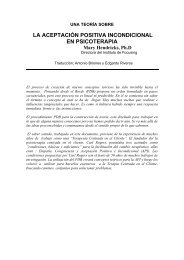8 Focusing en de experiëntiële aspecten van psychotherapie
8 Focusing en de experiëntiële aspecten van psychotherapie
8 Focusing en de experiëntiële aspecten van psychotherapie
You also want an ePaper? Increase the reach of your titles
YUMPU automatically turns print PDFs into web optimized ePapers that Google loves.
610 Literatuur<br />
Huygevoort, J. <strong>van</strong> (2000). Groeps<strong>psychotherapie</strong> als proeftuin. Tijdschrift Cliëntgerichte Psychothera-<br />
pie, 38, 18-34.<br />
Hycner, R., & Jacobs, L.M. (1995). The healing relationship in Gestalt therapy: A dialogical/self psychol-<br />
ogy approach. Highland, NY: Gestalt Journal Press.<br />
Iberg, J.R. (1981). <strong>Focusing</strong>. In J.R. Corsini (Red.), Handbook of innovative <strong>psychotherapie</strong>s (pp. 334-361).<br />
New York: Wiley.<br />
Iberg, J.R. (1982-83). Three focusing states applied to group work. The <strong>Focusing</strong> Folio, 2, 17-26.<br />
Iberg, J.R. (1990). Ms C’s focusing and cognitive functions. In G. Lietaer, J. Rombauts & R. Van Bal<strong>en</strong><br />
(Red.), Cli<strong>en</strong>t-c<strong>en</strong>tered and experi<strong>en</strong>tial psychotherapy in the nineties (pp. 173-203). Leuv<strong>en</strong>: Leuv<strong>en</strong><br />
University Press.<br />
Iberg, J.R.(1991) Applying statistical control theory to bring together clinical supervision and psychotherapy<br />
research. Journal of Consulting and Clinical Psychology, 59, 575-586.<br />
Iberg, J.R. (1996a). Finding the body’s next step: Ingredi<strong>en</strong>ts and hindrances. The Folio. A Journal for<br />
<strong>Focusing</strong> and Experi<strong>en</strong>tial Therapy, 15(1), 13-41.<br />
Iberg, J.R. (1996b) Using statistical experim<strong>en</strong>ts with post-session cli<strong>en</strong>t questionnaires as a stud<strong>en</strong>tc<strong>en</strong>tered<br />
approach to teaching the effects of therapist activities in psychotherapy. In R. Hutterer,<br />
G. Pawlowsky, P. Schmid & R. Stipsits (Red.), Cli<strong>en</strong>t-c<strong>en</strong>tered and experi<strong>en</strong>tial psychotherapy, A paradigm<br />
in motion (pp.255-271). Frankfurt: Peter Lang.<br />
Iberg, J.R. (1997). The three phases of focusing: an example from a t<strong>en</strong> year-old boy. The Folio. A Journal<br />
for <strong>Focusing</strong> and Experi<strong>en</strong>tial Therapy, 16, 67-74.<br />
Iberg, J.R. (2001). Unconditional positive regard: Constitu<strong>en</strong>t activities. In J. D. Bozarth & P. Wilkins<br />
(Red.), Rogers’ therapeutic conditions: Evolution, theory and practice. Volume 3. Unconditional positive<br />
regard (pp. 109-125). Ross-on-Wye, UK: PCCS Books.<br />
Iberg, J.R. (2002). Psychometric <strong>de</strong>velopm<strong>en</strong>t of measures of in-session focusing activity: The <strong>Focusing</strong>-ori<strong>en</strong>ted<br />
Session Report and the Therapist Ratings of Cli<strong>en</strong>t <strong>Focusing</strong> Activity. In J.C.Watson,<br />
R.N. Goldman, & M.S.Warner (Red.), Cli<strong>en</strong>t-c<strong>en</strong>tered and experi<strong>en</strong>tial psychotherapy in the 21st c<strong>en</strong>tury<br />
(pp. 221-246). Ross-on-Wye, UK: PCCS Books.<br />
IJz<strong>en</strong>doorn, M.H. <strong>van</strong> (2001). Gehechtheid <strong>en</strong> therapie: M<strong>en</strong>tale repres<strong>en</strong>taties <strong>van</strong> gehechtheid in <strong>psychotherapie</strong><br />
<strong>en</strong> interv<strong>en</strong>ties. Tijdschrift Cliëntgerichte Psychotherapie, 39, 182-196.<br />
Ingehov<strong>en</strong>, T. (2006). Bor<strong>de</strong>rline <strong>en</strong> medicatie. Bor<strong>de</strong>rline Bulletin, 10 oktober, p. 8.<br />
Iseli, C. (2006). Empathie in <strong>de</strong>r Psychotherapie mit Kin<strong>de</strong>rn und Jug<strong>en</strong>dlich<strong>en</strong>. Person. Internationale<br />
Zeitschrift für Personz<strong>en</strong>trierte und Experi<strong>en</strong>zielle Psychotherapie und Beratung, 10, 118-130.<br />
Jaison, B. (2006). Experiëntiële <strong>en</strong> kortdur<strong>en</strong><strong>de</strong> therapie geïntegreerd. Haarlem: De Toorts.<br />
Jaison, B., & Lawlor, M. (Red.). (1996-97). <strong>Focusing</strong> and research. The Folio. A Journal for <strong>Focusing</strong> and<br />
Experi<strong>en</strong>tial Therapy (Special issue), 15(2), 1-84.<br />
James, W. (1961). Psychology: The briefer course. New York: Dover (eerste editie in 1890).<br />
Janss<strong>en</strong>, M.C. (1985). Dat zegt me iets. De rol <strong>van</strong> expressie <strong>en</strong> communicatie in <strong>de</strong> relatie tuss<strong>en</strong> m<strong>en</strong>s<strong>en</strong>.<br />
Nijmeg<strong>en</strong>: Dekker & <strong>van</strong> <strong>de</strong> Vegt.<br />
Jaspers, K. (1932). Boundary situations. In Philosophy (Vol. 2). Chicago: The University of Chicago Press.<br />
Jaspers, K. (1986). Karl Jaspers: Basic philosophical writings. New Jersey: Humanities Press.<br />
J<strong>en</strong>n<strong>en</strong>, M. (1974). Onvoorwaar<strong>de</strong>lijke positieve gezindheid. Reflectie over <strong>de</strong> beleving <strong>en</strong> communicatie<br />
<strong>van</strong> <strong>de</strong>ze therapeutische grondhouding. Niet-gepubliceerd specialisatieverslag, K.U.Leuv<strong>en</strong>.<br />
J<strong>en</strong>nings, J.L. (1986). The dream is the dream is the dream. A person-c<strong>en</strong>tered approach to dream analysis.<br />
Person-c<strong>en</strong>tered Review, 1, 310-333.










